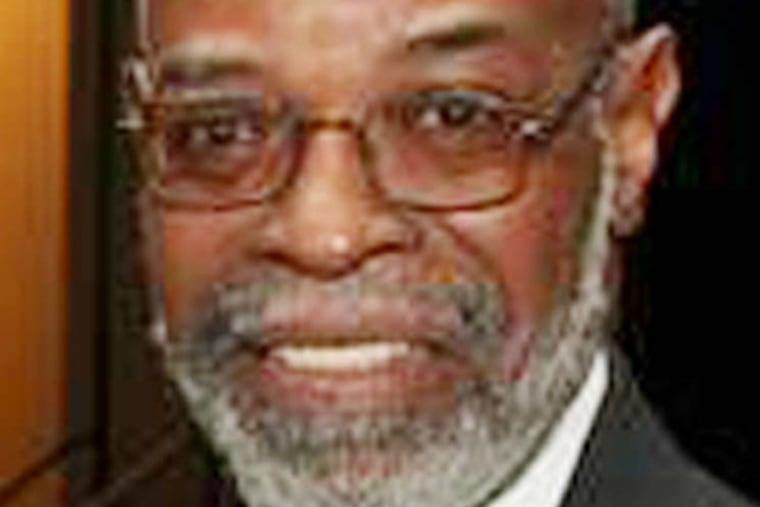Kernie L. Anderson, 74, a giant in African-American radio
He specialized in rescuing stations that were failing.

In the original obituary on radio legend Kernie L. Anderson in Monday's Daily News, some people were quoted without adequate attribution. They included:
Thera Martin-Milling, former news anchor at WDAS-AM/FM and program director of WHAT-FM; Wynne Alexander, who runs the WDASHistory.org website; Sara Lomax-Reese, president of WURD; and Karen Warrington, former WDAS news director and WHAT talk-show host.
Their quotes, and additional information, should have been attributed to an article written by Bobbi Booker, which appeared in The Philadelphia Tribune and on the website Examiner.com.
The Daily News apologizes for failing to give the proper attribution for these quotes.
KERNIE ANDERSON was always thinking.
"He was one of those black men whose brain was always rotating and moving and thinking about the next project," said Thera Martin-Milling, a Philadelphia radio broadcaster, in an Philadelphia Tribune article by Bobbi Booker.
What Kernie was thinking about was how to improve the radio stations he ran in a 32-year career in broadcasting for African-American audiences in Philadelphia and other urban centers around the country.
Kernie's restless brain was tracking "the next live broadcast, and what he could do from his position of authority in broadcasting to get the word out to black people," said Martin-Milling, a former news anchor at WDAS-AM/FM and program director of WHAT-FM.
Kernie L. Anderson, who was retired after a storied career in black radio, a community activist and Army veteran, died Saturday. He was 74 and lived in Wynnefield.
He was a major influence in the establishment of Unity Day, the annual Philadelphia celebration of family values and peace, and worked in other civic endeavors.
In Philadelphia radio, Kernie ran stations WDAS-AM/FM, WHAT-AM and WURD-AM.
Sara Lomax-Reese, president of WURD, said that Kernie "knew radio inside and out, when black radio was really at its zenith. He really understood the business principles of black radio and radio in general."
"He was a fixer," said W. Cody Anderson, longtime local broadcaster and no relation. "He would go into radio stations and would try to fix them and get them working appropriately, and he was excellent at what he did."
Quoted on the website Examiner.com, Cody Anderson, former general manager of WURD, who was replaced by Kernie in that position in July 2007, said of Kernie, "He was kind of like a loner, but he was a quality guy."
U.S. Rep. Chaka Fattah said in a statement that Kernie was "a giant in the radio industry. He was an authenic advocate for African-American communities and their economic interests, especially in the communications sector. He leaves a legacy of influence and excellence."
Kernie was the man who put Larry King on the road to national fame as a talk-show host when he hired him for that type of program at Miami's WOCN in the 1970s.
Through a publicist, King said that he loved working with Kernie. He recalled Kernie as a "great, great guy."
Wynne Alexander, who runs the WDASHistory.org website, said that Kernie saved WDAS from economic disaster in 1988.
"Their ratings had slumped, plummeted, dropped precipitously, and he was brought in to fix the place - and he did.
"The way he fixed it was by taking it back to its roots of, say, circa 1978. . . . He brought all of that back to the table. He was a stunning success.
"Today, a lot of people may be in radio, but that does not make them radio people. He knew how to make a station hum."
"He knew how to come in and right a wrong ship," said Patty Jackson, a WDAS-FM personality who worked with Kernie. "He knew how to turn things around, tighten the budget, get it going. He was a true leader, a visionary."
Karen Warrington, former WDAS news director and WHAT talk-show host, said Kernie "combined being a meticulous manager with a lot of compassion for the community and different issues going on."
"He was always a gentleman, and he came out of the tradition of black radio as a tool of advocacy, especially around black political leadership. For me, that is his legacy."
Kernie got to test the political power of black radio when he became manager of WBMX-FM/AM in Chicago in 1981, and supported the successful candidacy of Harold Washington, the first African-American mayor of Chicago, elected in 1983.
Kernie was born in Harrisburg and attended schools there before going to Howard University, in Washington, D.C. He started his radio career in Washington in 1963 as a messenger and porter at WQMR-AM/WGAY-FM. After a two-year hitch in the Army, he went to Miami and became general manager and managing partner of WOCN-AM/FM, in 1974.
It was there that he met and married Althmeana Coachman, an elementary-school teacher. She died in 2005 at 76.
Kernie next went to Jacksonville, Fla., as manager of WCGL. From there, he moved to the Oakland area in California to manage KDIA. After four years, he was off to Chicago. In 1988, he became vice president and general manager of WDAS, beginning his career in Philadelphia radio.
He retired from WURD in 2010 and joined the station's board of directors.
In retirement, Kernie, who had an extensive collection of African-American art, considered opening an art gallery.
He was a member of the Chamber of Commerce of Greater Philadelphia and the Urban League, among other community organizations.
He is survived by a daughter, Shama.
Services: A memorial service will be arranged.